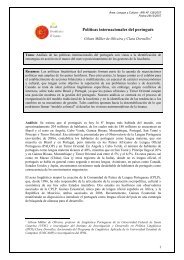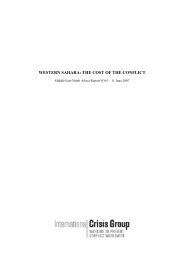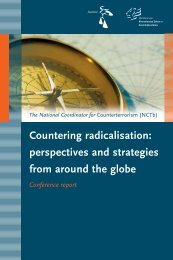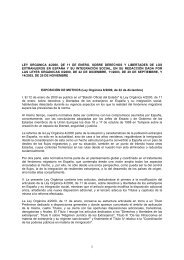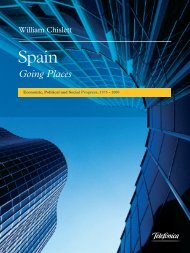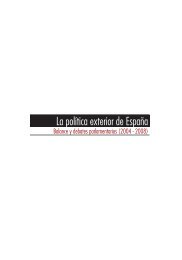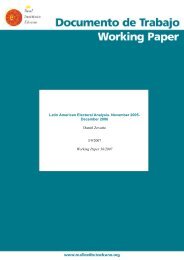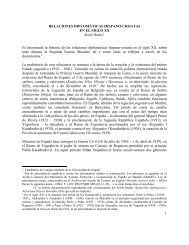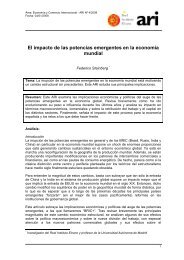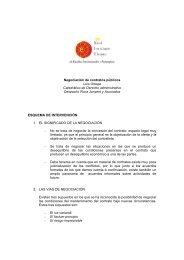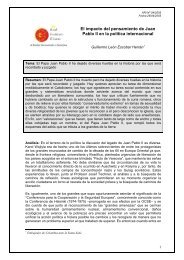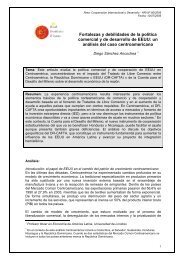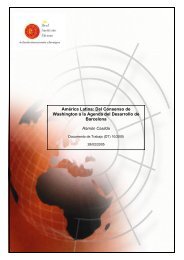Spain and the United States - Real Instituto Elcano
Spain and the United States - Real Instituto Elcano
Spain and the United States - Real Instituto Elcano
Create successful ePaper yourself
Turn your PDF publications into a flip-book with our unique Google optimized e-Paper software.
120<br />
SPAIN AND THE UNITED STATES<br />
S<strong>and</strong>inistas during <strong>the</strong> 1980s <strong>and</strong> <strong>the</strong> 1989 invasion of Panama) <strong>and</strong> supported<br />
right-wing dictators because <strong>the</strong>y were viewed as a bulwark against<br />
communism in <strong>the</strong>ir backyard. Spaniards with long memories recall that one of<br />
<strong>the</strong> reasons for <strong>the</strong> US support of <strong>the</strong> Franco regime (1939-75) was <strong>the</strong><br />
dictator’s staunch anti-communism.<br />
Today, it is <strong>the</strong> Middle East that raises <strong>the</strong> most passions, particularly <strong>the</strong><br />
war in Iraq <strong>and</strong> <strong>the</strong> issue of Palestine. 12 The re-election of George W. Bush in<br />
November 2004 intensified <strong>the</strong> negative feelings of many countries, including<br />
<strong>Spain</strong>, towards <strong>the</strong> <strong>United</strong> <strong>States</strong>. According to <strong>the</strong> March 2005 barometer of<br />
<strong>the</strong> <strong>Elcano</strong> Royal Institute, 68% of respondents felt his re-election was<br />
“negative for peace <strong>and</strong> security in <strong>the</strong> world”, ten points above <strong>the</strong> world<br />
average but lower than in France (75%) <strong>and</strong> Germany (77%). When asked in<br />
<strong>the</strong> Pew survey what was <strong>the</strong> main problem with <strong>the</strong> <strong>United</strong> <strong>States</strong>, 76% of<br />
Spaniards said it was mostly President Bush, by far <strong>the</strong> highest proportion of<br />
all <strong>the</strong> countries surveyed (see Exhibit 6.10). A low regard for Bush is more<br />
heavily correlated with an unfavourable rating for <strong>the</strong> <strong>United</strong> <strong>States</strong> than any<br />
o<strong>the</strong>r attitude or opinion tested in <strong>the</strong> survey.<br />
Exhibit 6.10 What’s <strong>the</strong> Problem with <strong>the</strong> <strong>United</strong> <strong>States</strong>? (%)<br />
Lastly, Spaniards tend to associate Americans, more than o<strong>the</strong>r countries<br />
do, with <strong>the</strong> negative traits “greedy” <strong>and</strong> “violent” <strong>and</strong> less with <strong>the</strong> positive<br />
characteristics “honest,” “inventive” <strong>and</strong> “hardworking” (see Exhibit 6.11).<br />
12. It is not lost on Spaniards that <strong>the</strong> controversial US prison camp for suspected terrorists at Guantánamo<br />
Bay in Cuba was Spanish territory ceded to <strong>the</strong> <strong>United</strong> <strong>States</strong> at <strong>the</strong> end of <strong>the</strong> 1898 Spanish-American war.



